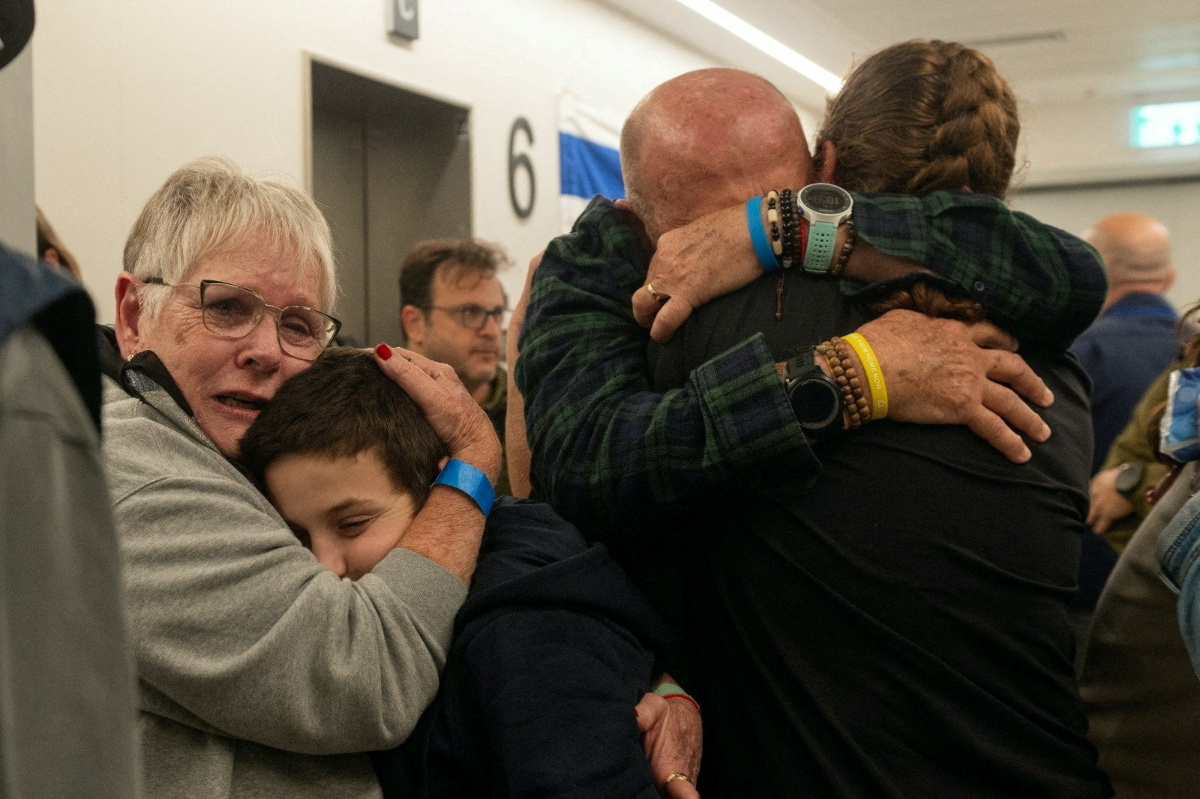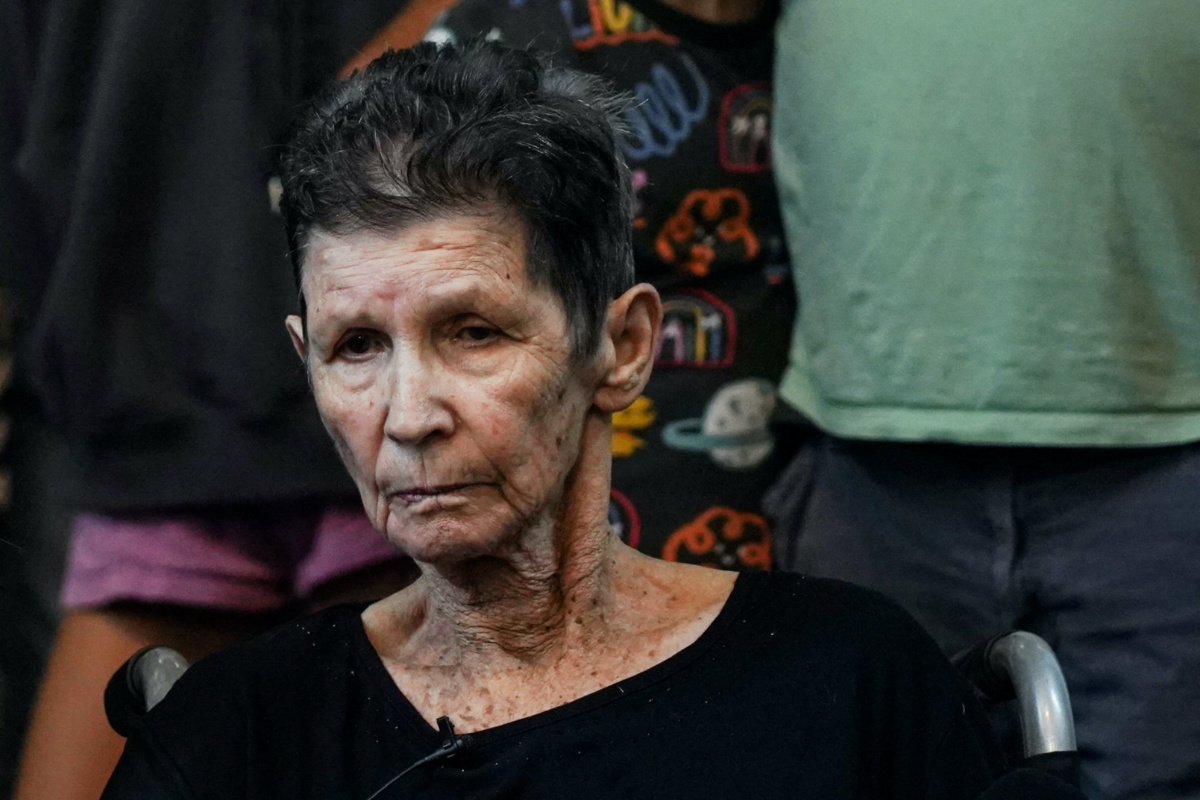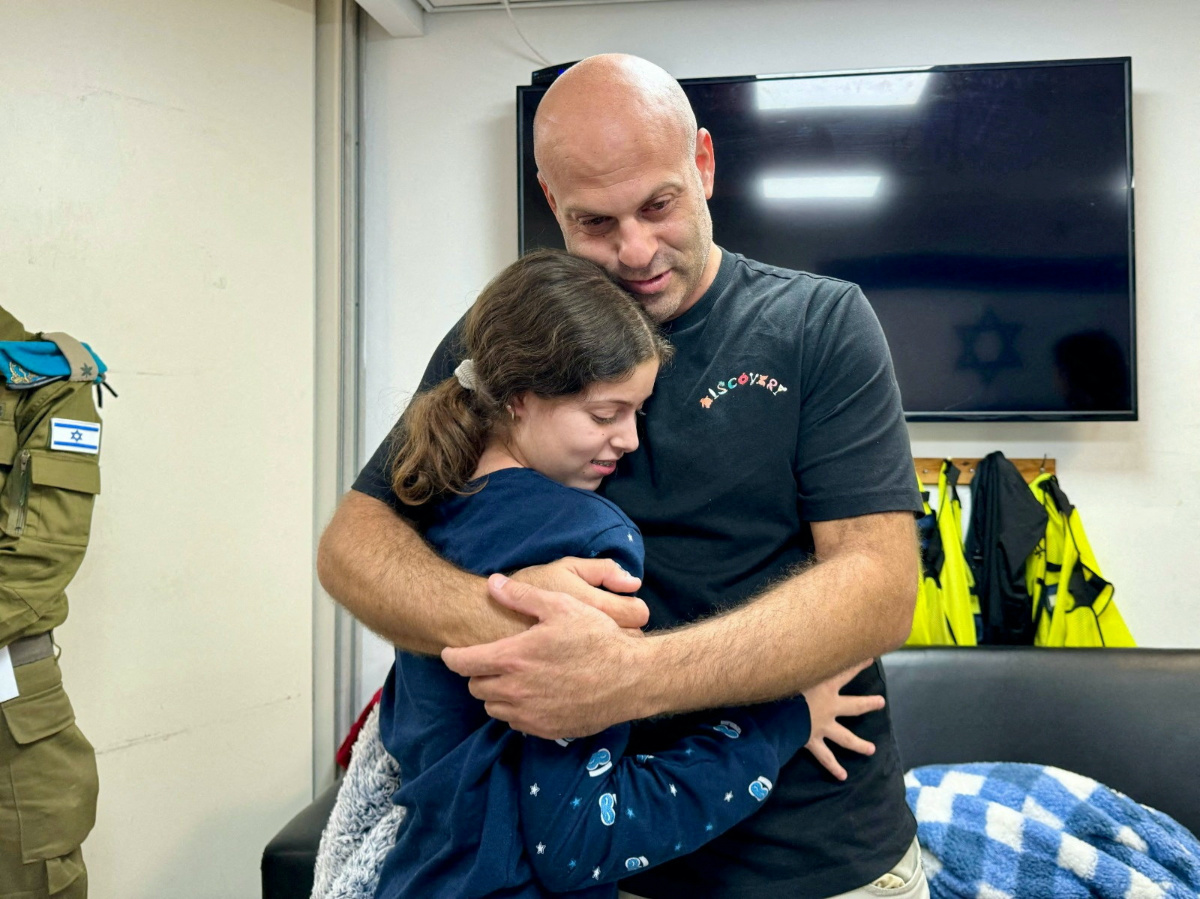Jerusalem
Reuters
Israeli women and children on their return from Hamas captivity in Gaza speak of being beaten and threatened with death, moved from place to place and forced to whisper during weeks spent with little to do, their families say.
Most hostages released during a six-day-old truce have been rushed to hospitals out of sight in a country still reeling from the shock of their abduction during a Hamas rampage on 7th October in which Israel says 1,200 people were killed.

Gal Goldstein-Almog, 11, who was released from the Gaza Strip on 26th November after being taken hostage by the Palestinian militant group Hamas during the 7th October attack on Israel, is embraced by a loved one shortly after being reunited with his family, at Schneider Children’s Medical Center of Israel in Petah Tikva, Israel, in this handout picture released by Schneider Children’s Medical Center of Israel on 27th November, 2023. PICTURE: Schneider Children’s Medical Center of Israel/Handout via Reuters
ISRAELI EX-HOSTAGE SAYS SHE CONFRONTED HAMAS CHIEF YAHYA SINWAR IN GAZA TUNNEL
An 85-year-old Israeli woman abducted by Hamas on 7th October and set free two weeks later said she met its Gaza leader Yahya Sinwar while in captivity and asked him how he was not ashamed for having acted violently against peace activists like herself.
Yocheved Lifshitz, 85, was taken from her Kibbutz Nir Oz home in Israel to Gaza. She told the Israeli newspaper Davar she confronted Sinwar when he visited the hostages in an underground tunnel where Hamas was holding them captive.

Yocheved Lifshitz, 85, an Israeli grandmother who was held hostage in Gaza looks on after being released by Hamas militants, at Ichilov Hospital in Tel Aviv, Israel, on 24th October, 2023. PICTURE: Reuters/Janis Laizans/file Photo
“Sinwar was with us three to four days after we arrived,” Lifshitz told the Hebrew-language Davar newspaper. “I asked him how he is not ashamed to do such a thing to people who all these years have supported peace.”
“He didn’t answer. He was silent,” she said.
Lifshitz is a peace activist who, together with her husband, helped sick Palestinians in Gaza get to hospital for years, her grandson told Reuters. Her 83-year-old husband, Oded, was also kidnapped from their home and remains in captivity.
Speaking with reporters following her release from Hamas captivity last month, Lifshitz said that she “went through hell” during her two weeks as a hostage in the Gaza Strip.
Lifshitz was one of four women freed by Hamas early in the war. She said she had been beaten when she was abducted but was then treated well during her two-week captivity.
On her release, she turned to shake the hand of a masked captor. Asked why, she replied: “They treated us gently and met all our needs.”
Danny Brom, director of METIV: The Israel Psychotrauma Center, said some will need medical treatment but others will not. Many will need to talk, and “the main issue that needs to be restored is a sense of control,” he said.
“People coming through horrific things are not sick,” Brom said. “They need to cope with it, they need to get space, time and a warm environment in order to do that, but not necessarily in a medical setting.”
Since the latest round of releases began on Friday, with Israel releasing some jailed Palestinians in exchange, the freed hostages have been kept away from the media.
Their stories have come out through the filter of family members, without independent verification. They offer a hint of their ordeal. Most of the 240 hostages that Israel says were seized on 7th October are still in captivity.
Deborah Cohen told France’s BFM TV she had been told her 12-year-old nephew Eitan Yahalomi and others were beaten by Gazan residents on arrival in the enclave after the Hamas rampage. She said his captors made him watch footage of the Hamas violence.
“Every time a child cried there, they threatened them with a weapon to make them be quiet. Once they got to Gaza, all the civilians, everyone was hitting them…We’re talking about a child 12-years-old,” she said.
Hamas portrays the treatment of hostages as humane, and says it has treated the hostages in accordance with Islamic teachings to preserve their lives and wellbeing.
But the Palestinian militant group says some hostages were killed by air strikes during a military offensive that was launched in response to the 7th October assault and has killed more than 15,000 people, according to Palestinian health officials in Hamas-ruled Gaza.
Speaking in whispers
The families of two girls who were held together found it hard to hear their children on their return home because they spoke only in whispers.
“I had to put my ear close to her mouth to hear. In captivity she was told not to make any noise. You can see the terror in her eyes,” Thomas Hand, the father of nine-year-old Emily Hand, told CNN.
On her return, she was told that Narkis, Hand’s former wife who had helped care for Emily, had been killed on 7th October.
“Last night she cried until her face was red, she couldn’t stop. She didn’t want any comfort, I guess she forgot how to comfort herself. She got under the covers, covered herself and cried quietly,” he said.
Yair Rotem said his niece Hila Rotem Shoshani, 13, was held with Emily Hand, and was also now speaking in whispers. She spoke of hugging her mother Raaya, still in Gaza, who cried when the girls were taken from her before their return to Israel.
Merav Mor Raviv said captors of her cousin Keren Munder, Keren’s nine-year-old son Ohad and mother Ruth, spoke Hebrew and at times would motion with a finger across their throats as if to warn of death if they didn’t do as asked.
She told Israel’s Channel 12 they were moved from place to place, both underground and above ground. They lost weight as food was scarce at times, and ate mostly rice and pita bread for days.
We rely on our readers to fund Sight's work - become a financial supporter today!
For more information, head to our Subscriber's page.
Officials at Israeli hospitals say hostages experienced poor nutritional health, and many with chronic diseases were denied medical treatment, causing serious health problems.
Elma Avraham, 84, released on Sunday, was in a “fight for her life,” according to hospital staff.
“They held her in terrible conditions,” daughter Tali Amano said. “My mother arrived hours before we would have lost her.”

Hila Rotem-Shoshani, who was abducted by Hamas gunmen during the 7th October attack on Israel, meets a family member after being released as part of a hostages-prisoners swap deal between Hamas and Israel amid a temporary truce, at an unknown location in Israel, in this handout image released on 26th November, 2023. PICTURE: Israel Defense Forces/Handout via Reuters
Thoughts of being reunited
Ahal Besorai said his niece and nephew, Alma and Noam Or, 13 and 16, and a woman in their room had shared a diary, but the children were prevented from taking it when their captors removed the two of them.
He told CNN the children thought they were being taken to the toilet but the militants “handcuffed them, blindfolded them, [and] took them to the car that took them to the place where they were being handed over to the Red Cross.”
“They tried to hide it from the lady who stayed behind, all on her own,” Besorai said.
One Israeli mother, Daniel Aloni, wrote to thank Hamas’ armed al-Qassam Brigades before her release with daughter Emilia. Their story went viral in Arabic media.
Daniel wrote to thank them for giving Emilia sweets and fruit and treating her daughter like a queen.
“I will forever be thankful that she doesn’t leave here with trauma,” she wrote. “If only in this world we could truly be good friends.”
Reuters was unable to reach Aloni or her family for comment on the letter written in captivity.






